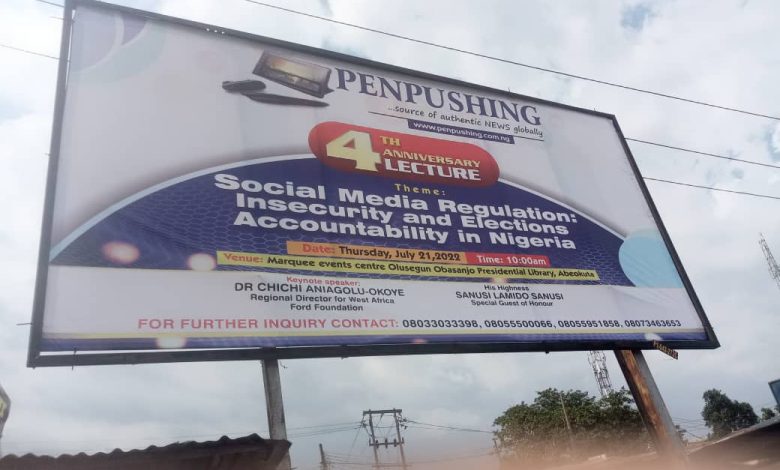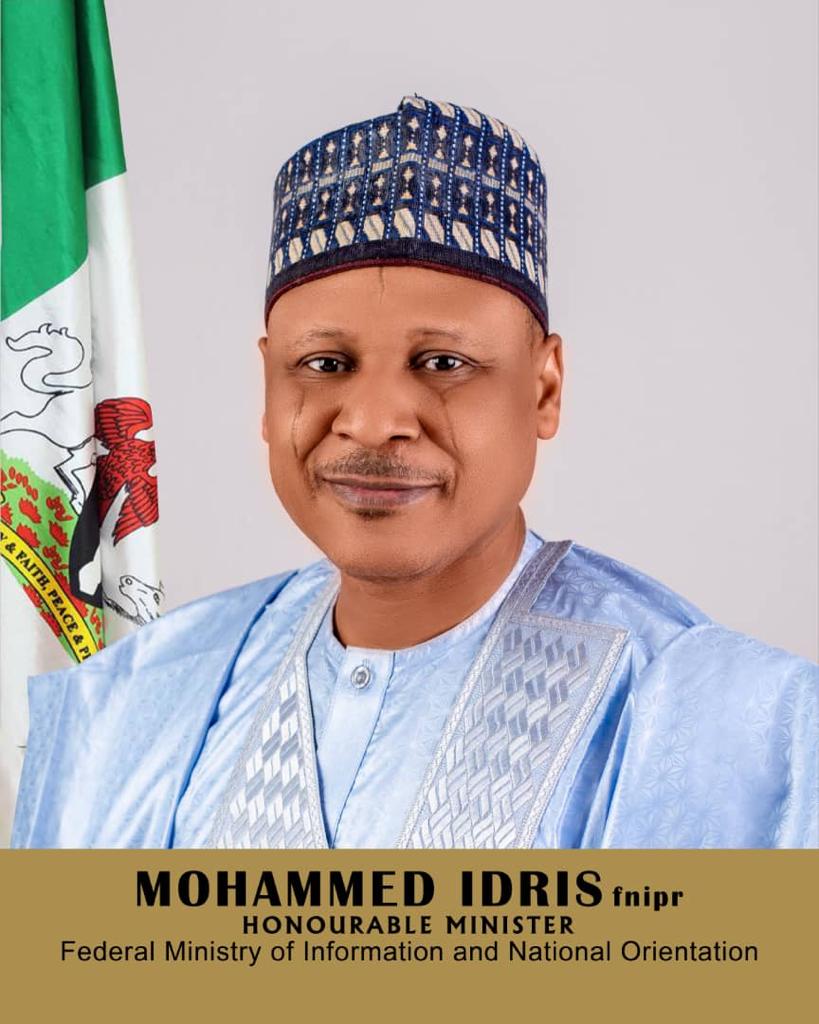By Chimezie Godfrey
Stakeholders made up of media practitioners and politicians across the country have called for regulation of social media platforms to ensure accountability and credible elections in the country.
The stakeholders made their resolution known in a communique jointly signed by the Founder of the Organization, Dimeji Kayode-Adedeji and the Chairperson, Planning Committee, Abiola Akiyode-Afolabi at the end of the 4th Anniversary Lecture of Pen-Pushing Media tittled,”Social Media Regulation: Insecurity and Election in Nigeria,” held in Abeokuta, Ogun state on Thursday.
The Anniversary Lecture was a convergence of political and media practitioners in the country among whom were former governor of Ogun State, Otunba Gbenga Daniel; the 14th Emir of Kano, His Highness, Muhammad Sanusi Lamido; the wife of a former President of Nigeria, Chief (Mrs.) Bola Obasanjo,, Kunle Oluomo, Speaker, Ogun State House of Assembly, and Regional Director for West Africa, Ford Foundation, Dr. Chichi Aniagolu-Okoye, who was the Keynote Speaker.
Panelists included Lanre Arogundade, Founder, International Press Centre; ; Toun Okewale-Sonaiya, Founder WFM Radio; Almajid Alli, Former Deputy Inspector General of Police; represented by Muyiwa Adejobi, Nigerian Police Force Public Relations Officer, Nigeria Police and Bridget Osakwe, National Coordinator, West African Network for Peace Building, among others.
The communique stated that participants including eminent traditional rulers, media practitioners and online operators deliberated on issues including the following:
Participants noted that social media has become an important tool of political activism and a platform for informal political debates, adding that with the existing data of thirty-three million social media users in Nigeria as of January 2021, and a cellphone access figure of over 48 percent as well as internet access of 36 percent, social media remains the first port of call for many information-seekers and the available medium to willing information-givers. Hence, the bad, the good and, the ugly become occupiers of the social media space, dealing in all kinds of information, which could be inimical or advantageous to national growth and unity.
It stated that participants further observed that the situation has ushered in an era of information disorder where fake news, misinformation, and/or disinformation thrives and because consumption of mobile social media contents has become the norm, it is becoming increasingly difficult to track the spread of false information.
The Communique stressed that participants noted that while there are adequate laws in the statute books, all efforts by the Nigerian government at regulating the social media have been self-serving and misdirected.
It revealed that participants in the light of the foregoing resolved that there is need for the social media to be regulated, among other measures.
The Communique stated,”Participants resolved that there must be some sort of regulation of social media platform as regards to it’s usage to achieve accountability and credible elections.
“Stakeholders who are in support of co-regulation as canvassed by the guest speaker expressed concern over the use of social media in the promotion of hate speeches, and fake news adding that they are security threats and risks to credible process regarding the forth-coming general elections especially as people hide under or use social media to spread hate speeches, hack private accounts, as well as misinterpret and misrepresent others deliberately.
“After an exhaustive deliberation on achieving sanity in the use of social media through regulation, the participants emphasised that co-regulation is the key involving all the necessary stakeholders . Since the media is crucial to governance, participants charged social media practitioners to be conversant with and function within the specific ambit of existing laws and self regulate where necessary.
“Participants charged the government to be more responsive to citizens needs and aspirations , building trust between it and the citizens, such that social media regulation in whatever guise will get the buy-in of the people and will not be viewed with suspicion, stressing that government can only function effectively when it is trusted by the citizens.
“Participants also challenged social media platforms to do much more in bringing about electoral reforms, checkmate endemic problems like vote buying, rigging in whatever form, electoral violence, thuggery, manipulation of electoral laws by both politicians and security agents, as well as poor participation in the electoral process, adding that the media must assist in building on the success of the recently-concluded Osun governorship election.”
It added,”Concluding, participants challenged social media platforms to be responsible and self-regulate, mobilise for mass participation in the coming elections, and to foster greater unity among Nigerians.”




